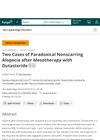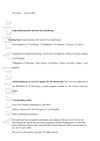Stem cell treatments show promise for hair loss but need more research.
 12 citations
,
December 2022 in “JEADV. Journal of the European Academy of Dermatology and Venereology/Journal of the European Academy of Dermatology and Venereology”
12 citations
,
December 2022 in “JEADV. Journal of the European Academy of Dermatology and Venereology/Journal of the European Academy of Dermatology and Venereology” New oral treatments for adult hair loss show promise, especially JAK inhibitors, with mild side effects.
 7 citations
,
October 2022 in “Expert opinion on emerging drugs”
7 citations
,
October 2022 in “Expert opinion on emerging drugs” New drugs for alopecia areata show promise but aren't universally effective, and hair loss often returns after stopping treatment.
 2 citations
,
July 2022 in “Dermatologic Therapy”
2 citations
,
July 2022 in “Dermatologic Therapy” Both botulinum toxin A and multivitamin mesotherapy effectively treat hair loss, with botulinum toxin A being the better single-session option.
2 citations
,
March 2022 in “Journal of The European Academy of Dermatology and Venereology” Combining dutasteride injections with oral minoxidil may improve hair regrowth more than using oral minoxidil alone.
 8 citations
,
March 2022 in “Journal of Cosmetic Dermatology”
8 citations
,
March 2022 in “Journal of Cosmetic Dermatology” Mesotherapy might help with hair loss but more research is needed.
 3 citations
,
January 2022 in “Journal of Cosmetic Dermatology”
3 citations
,
January 2022 in “Journal of Cosmetic Dermatology” Botox can effectively treat hair loss with some side effects and high cost, while LC hair serum also shows great results with fewer side effects.
4 citations
,
December 2021 in “Dermatologic Therapy” Mesotherapy for hair loss can cause temporary forehead swelling.
 August 2021 in “Skin appendage disorders”
August 2021 in “Skin appendage disorders” Two people lost hair unexpectedly after getting a common hair loss treatment with a drug called Dutasteride.
 April 2021 in “Journal of Cosmetic Dermatology”
April 2021 in “Journal of Cosmetic Dermatology” Stem cell treatment improved hair density in female hair loss patient.
 3 citations
,
April 2021 in “Journal of Cosmetic Dermatology”
3 citations
,
April 2021 in “Journal of Cosmetic Dermatology” Combination therapy with QR 678 Neo and 5% Minoxidil is most effective for male hair loss.
 4 citations
,
April 2021 in “Journal of Cosmetic Dermatology”
4 citations
,
April 2021 in “Journal of Cosmetic Dermatology” Intradermal injections improve hair density and thickness better, while derma roller is more convenient.
 February 2021 in “Dermatologic Therapy”
February 2021 in “Dermatologic Therapy” Injections improve hair growth, density, and thickness in women safely.
 23 citations
,
January 2021 in “Journal of Dermatological Science”
23 citations
,
January 2021 in “Journal of Dermatological Science” The document concludes that we need more research to understand Telogen Effluvium and find effective treatments.
 7 citations
,
December 2020 in “Dermatologic Therapy”
7 citations
,
December 2020 in “Dermatologic Therapy” Injections with 0.5% minoxidil effectively treat female hair loss, increasing hair density and thickness.
 13 citations
,
May 2020 in “Journal of Plastic Reconstructive and Aesthetic Surgery”
13 citations
,
May 2020 in “Journal of Plastic Reconstructive and Aesthetic Surgery” Botulinum toxin's effectiveness for treating scalp alopecia is not well-supported due to insufficient data.
49 citations
,
May 2020 in “The Scientific World JOURNAL” Mesotherapy is a skin injection therapy used for pain and local conditions, with scientific support but needing more clinical trials.
 65 citations
,
April 2020 in “International Journal of Molecular Sciences”
65 citations
,
April 2020 in “International Journal of Molecular Sciences” PRP injections may be a safe, effective alternative for hair loss treatment compared to minoxidil and finasteride.
34 citations
,
January 2020 in “Expert opinion on drug delivery” New methods like microneedling and nanoparticles can improve hair loss treatments.
 5 citations
,
January 2020 in “Skin appendage disorders”
5 citations
,
January 2020 in “Skin appendage disorders” Oral dutasteride works better for hair loss, but has more sexual side effects; intralesional dutasteride is a possible alternative.
 2 citations
,
December 2019 in “Journal of Dermatological Treatment”
2 citations
,
December 2019 in “Journal of Dermatological Treatment” Metabolic syndrome reduces effectiveness of hair loss treatment.
 11 citations
,
May 2019 in “Journal of Cosmetic Dermatology”
11 citations
,
May 2019 in “Journal of Cosmetic Dermatology” Mesotherapy helps treat male hair loss effectively.
 2 citations
,
January 2019 in “Annals of dermatology/Annals of Dermatology”
2 citations
,
January 2019 in “Annals of dermatology/Annals of Dermatology” A patient experienced permanent hair loss due to an allergic reaction to a corticosteroid injection.
11 citations
,
January 2019 in “International Journal of Trichology” Mesotherapy is not significantly better than minoxidil for treating male hair loss.
 6 citations
,
November 2017 in “Journal of the European Academy of Dermatology and Venereology”
6 citations
,
November 2017 in “Journal of the European Academy of Dermatology and Venereology” A woman got melanoma on her scalp after anti-hair loss treatment with injections.
 70 citations
,
February 2017 in “Dermatologic Surgery”
70 citations
,
February 2017 in “Dermatologic Surgery” Treatment with plasma rich in growth factors improved hair density and thickness for hair loss patients.
 18 citations
,
February 2017 in “Journal of Cosmetic Dermatology”
18 citations
,
February 2017 in “Journal of Cosmetic Dermatology” Mesotherapy for hair loss can sometimes cause more hair loss and scarring.
24 citations
,
January 2017 in “International Journal of Trichology”  110 citations
,
August 2016 in “Drugs”
110 citations
,
August 2016 in “Drugs” Minoxidil is the only FDA-approved topical drug for treating male or female pattern hair loss, and other medications like finasteride and dutasteride can also increase hair growth.
2 citations
,
May 2015 in “International Journal of Scientific Reports” Neonatal mesenchymal stem cell therapy shows promise for treating hair loss but needs more research.
 17 citations
,
January 2013 in “Our Dermatology Online”
17 citations
,
January 2013 in “Our Dermatology Online” Dutasteride mesotherapy helps treat male hair loss but may harm sperm and sexual function.
 34 citations
,
December 2012 in “Indian Journal of Dermatology, Venereology and Leprology”
34 citations
,
December 2012 in “Indian Journal of Dermatology, Venereology and Leprology” Mesotherapy shows promise for cellulite and facial rejuvenation but has mixed results for body sculpting and hair loss, with more research needed for safety and effectiveness.
 41 citations
,
April 2012 in “Journal of The European Academy of Dermatology and Venereology”
41 citations
,
April 2012 in “Journal of The European Academy of Dermatology and Venereology” Dutasteride-containing mesotherapy effectively treats female hair loss, improving density and thickness with minimal side effects.
 25 citations
,
January 2010 in “International Journal of Trichology”
25 citations
,
January 2010 in “International Journal of Trichology” Mesotherapy for hair loss lacks evidence of effectiveness and safety and should not be used without further scientific support.
 49 citations
,
July 2009 in “Journal of the American Academy of Dermatology”
49 citations
,
July 2009 in “Journal of the American Academy of Dermatology” Some people experienced hair loss after mesotherapy treatments for hair loss.

































